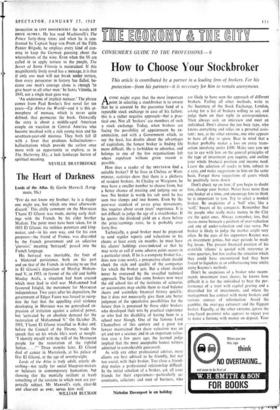The Heart of Darkness
'You do not know my brother; he is a dagger one might use, but which one must afterwards discard.' This chilly comment on the Moroccan T'hami El Glaoui was made, during early deal- ings with the French. by his elder brother Madani. The point must have been taken, for in 1955 El Glaoui, the ruthless potentate and king- maker, and—in his own way, and for his own purposes—the friend of France, was discarded by the French government and an adjective `glaouise,' meaning 'betrayed,' passed into the French language.
His betrayal was inevitable, the fruit of a blinkered persistence, both on his part and on that of the French. in refusing to see that in El Glaoui's deposition of Moulay Moham- med V, in 1953, in favour of the old and feeble Moulay Arafa, a situation had been created which must lead to civil war. Mohammed had favoured Istiqlal, the movement for Moroccan independence. Two years after his deposition, the government of Edgar Faure was forced to recog- nise the fact that the appalling civil violence developing in Morocco was no generalised ex- pression of irritation against a colonial power, but 'activated by an absolute demand for the restoration of Mohammed V.' On October 26, 1955, T'hami El Glaoui travelled to Rabat and, before the Council of the Throne, 'made the speech that set his whole life's work at nought. "I identify myself with the will of the Moroccan people for the restoration of the rightful Sultan. . . ." ' Three months later, El Glaoui died of cancer in Marrakesh, at his palace of Dar El Glaoui, at the age of seventy-eight.
Lords of the Atlas is truly adult, utterly ab- sorbing—not really for social blueprint-makers or believers in contemporary humanism, but showing (for the mentally resilient at least) something of the torsions to which men are per- petually subject. Mr Maxwell's style, clear-lit and clear-cut as ever, serves him well _WILLIAM BUCHAN


































 Previous page
Previous page